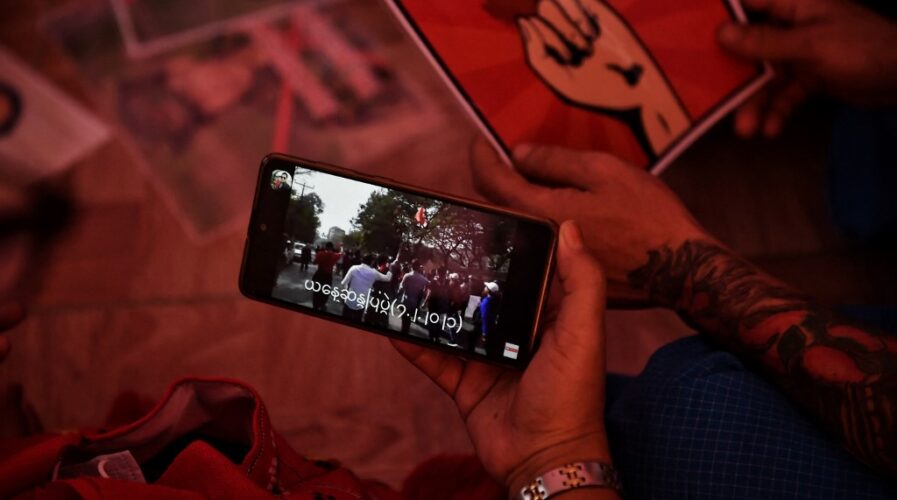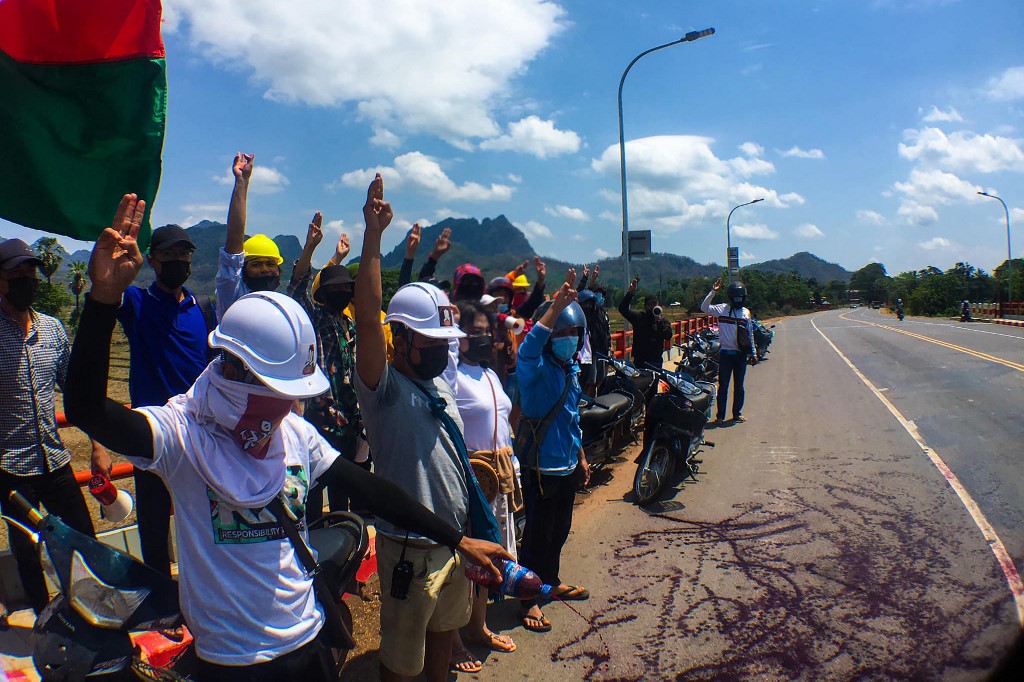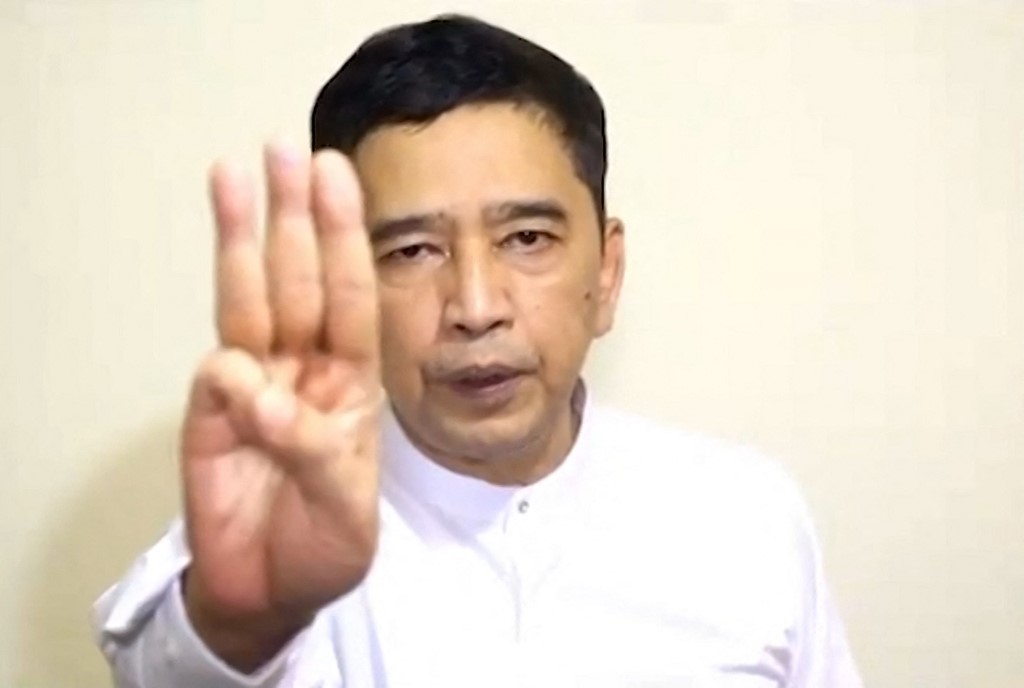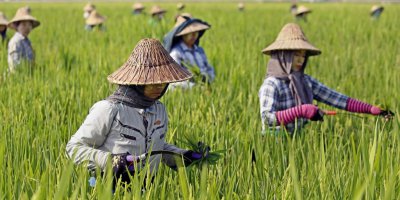
Myanmar migrants watching footage of mass protests in Yangon, as they gather at a house in the outskirts of Bangkok. (Photo by Lillian SUWANRUMPHA / AFP)
The revolution in Myanmar, Thailand will be digitized
Taking inspiration from the protest movements first in Hong Kong, then in Taiwan and neighboring Thailand, youth activists in Myanmar have been inspired to join the digital #MilkTeaAlliance online campaign that is uniting pro-democracy protestors across Asia.
Following the military-led coup in Myanmar on February 1 – immediately after the democratically-held national elections – protestors quickly took to the streets and to cyberspace, calling for the ouster of the military junta that had deposed and detained incumbent president Aung San Suu Kyi along with other members of the NLD ruling government that had won the elections.
The Myanmar digital protests worried the military rulers as much as the street-level outcry, as the internet-savvy youth movement took cues from the #MilkTeaAlliance that had originated in Hong Kong when pro-democracy youth wanted to be heard overseas, resulting in broad international coverage and democratic countries pressurizing the People’s Republic of China to relent on upholding democratic elections.

Protesters holding up the three finger salute in front of red paint representing blood spilled during protests against the military coup. (Photo by Handout / Eindu Youths / AFP)
Within weeks in Myanmar, the social media posts and videos had been so effective at spreading incidents of military crackdowns on protestors, arrests of public officials, and other incidents damaging to the regime that the dictatorship cut off internet access. This did not deter driven young activists, who were forced to learn about virtual private networks (VPNs) to access the internet and mask their IP addresses, which can be used to an extent to track protesters’ location and identities.
Reinvigorated by the movement in Myanmar, the nearly year-long protests in Thailand against that country’s military-led government have gained renewed momentum. Digital-savvy protestors in both countries have turned to social media to get their messages to a wider international community, with the hashtags #WhatsHappeningInMyanmar and #WhatsHappeningInThailand being used to boost coverage of what’s happening on the ground, similarly inspired by the #MilkTeaAlliance collective.
Another persuasive online strategy that both countries have adopted is the co-opting of revolutionary symbols from popular media to create a powerful image and drum up social awareness. In particular, the three fingered-salute from the popular film and book franchise The Hunger Games was often flashed at both Thai and Burmese protests as a symbol of defiance against authoritarian governments and political elites – a symbol that has repeatedly cropped up online in relation to the struggle in both countries, and has been flashed by everyone from politicians to commoners in solidarity against the military regimes.

Prominent pro-democracy leader Min Ko Naing, holding up the three-finger salute as he announces the formation of a National Unity Government including different ethnic groups, amid a crackdown on protests against the military coup. (Photo by – / Committee for Representing Pyidaungsu Hluttaw – CRPH / AFP)
The growth of these protest movements online has caused social media giants like Facebook and Twitter to reconsider their role in providing and disseminating information. Facebook, which was criticized in 2018 for not doing enough to curb online hate speech directed at Myanmar’s Rohingya minority, took down all accounts linked to the country’s military on February 25. This is significant in Myanmar, where Facebook is considered largely synonymous with the internet for most citizens. In Thailand, Twitter removed 926 fake accounts that it attributed to the military in October 2020, and Facebook took down 185 military-linked accounts and groups in March 2021.
Unfortunately, the ongoing civil disobedience – both online and offline – has largely brought Myanmar’s economic activities to a halt. Businesses face considerable operational challenges, on top of the existing health risks associated with the pandemic., and those along with brutal crackdowns on protestors mean that Myanmar’s once-promising economic trajectory has been set back by an unknown factor.
Foreign firms operating in the country, such as Norway’s Telenor telecommunications provider and French energy firm Total, are reportedly forced to comply with the ruling junta’s directives, out of fear that their employees and resources in the country will be threatened if they do not. Telenor for instance, must comply with the regime’s orders to restrict data access, while having to pay its annual license fee.
While there is hope that sanctions and pressure from foreign nations will eventually bring both the Myanmar and Thai military leaders to discuss resolutions, at the moment the climate is uncertain. Misinformation campaigns being spread online by the two regimes has divided international opinion to a degree – but what is certain is the digitally-native young activists of the #MilkTeaAlliance in both countries will continue to pursue means to get the message about what is happening in their homelands, out to the wider world in the hope of prompting change.
READ MORE
- Ethical AI: The renewed importance of safeguarding data and customer privacy in Generative AI applications
- How Japan balances AI-driven opportunities with cybersecurity needs
- Deploying SASE: Benchmarking your approach
- Insurance everywhere all at once: the digital transformation of the APAC insurance industry
- Google parent Alphabet eyes HubSpot: A potential acquisition shaping the future of CRM


